“Hell has come to you.” Will the village of Peremoha celebrate Victory Day after Russian occupation?
On 9 May 2022, when Russia celebrates Victory Day commemorating the 1945 victory over Nazism, Vladimir Putin conferred the title of "Guard" on the 15th Motorized Rifle Peacekeeping Brigade. Major Aleksandr "Norman" Vasilyev, 40, was among the Russian "peacekeepers" marching on Kyiv in February 2022 in what they expected to be a victorious march. In the village of Peremoha, in the Brovary district of Kyiv Oblast, the major took it upon himself to re-enact the village's dark past in the present.
Like Nazi soldiers during World War II, Vasilyev and his accomplices murdered civilians. Following Peremoha's liberation in spring 2022, charred bones and human remains were found among the rubble of the building the Russians used as their torture chamber. On 28 February 2022- the first day of Peremoha's occupation by Russian forces - five men were executed in the village.
According to various sources, 15 to 20 people were killed or went missing in Peremoha by 30 March 2022. The Russian soldiers used explosives and laid fires to obscure traces of their crimes. "Someone was going through the rubble of the Nova Poshta [a popular Ukrainian post service - ed.] branch and found a foot," Oleksandr Yarmolchyk, an Orthodox Church of Ukraine rector of the Church of the Nativity of the Blessed Virgin Mary, told Ukrainska Pravda. "We went through everything with our own hands to make sure nothing was left behind, and collected an entire coffin's worth of human remains."
A new mass grave appeared in the village - right next to the old one, where remains of the victims of the German occupation were buried after Ukraine became independent. Those remains were found among the blooms in Peremoha's gardens. Until 1945, Peremoha [Victory in Ukrainian - ed.] was called Yadlivka.
"For tortured, burned to death, unknown boys," reads the 2022 plaque. "For collective heroism and bravery," reads Putin's decree honouring the 15th brigade. "Hell has come to you [smiley face]," reads the inscription an unknown Russian soldier left in a grocery store in Peremoha.
Hostages
"I'm obsessed with flowers - almost incurably. I'd often ask on the internet: 'Please advise me of how to cure this obsession,' and people say 'Just plant [your flowers] over with grass'. But how can I plant them over with grass?!
Children, grandchildren, and flowers are my lifeline, my joy." This spring, Tamara Martynko, 60, is hoeing flower beds that the Russians trampled down a year ago with even more zeal than usual. Tamara, her daughter, and another dozen villagers who had been hiding in her basement spent 18 days as Russian hostages before they were able to flee using a humanitarian corridor.
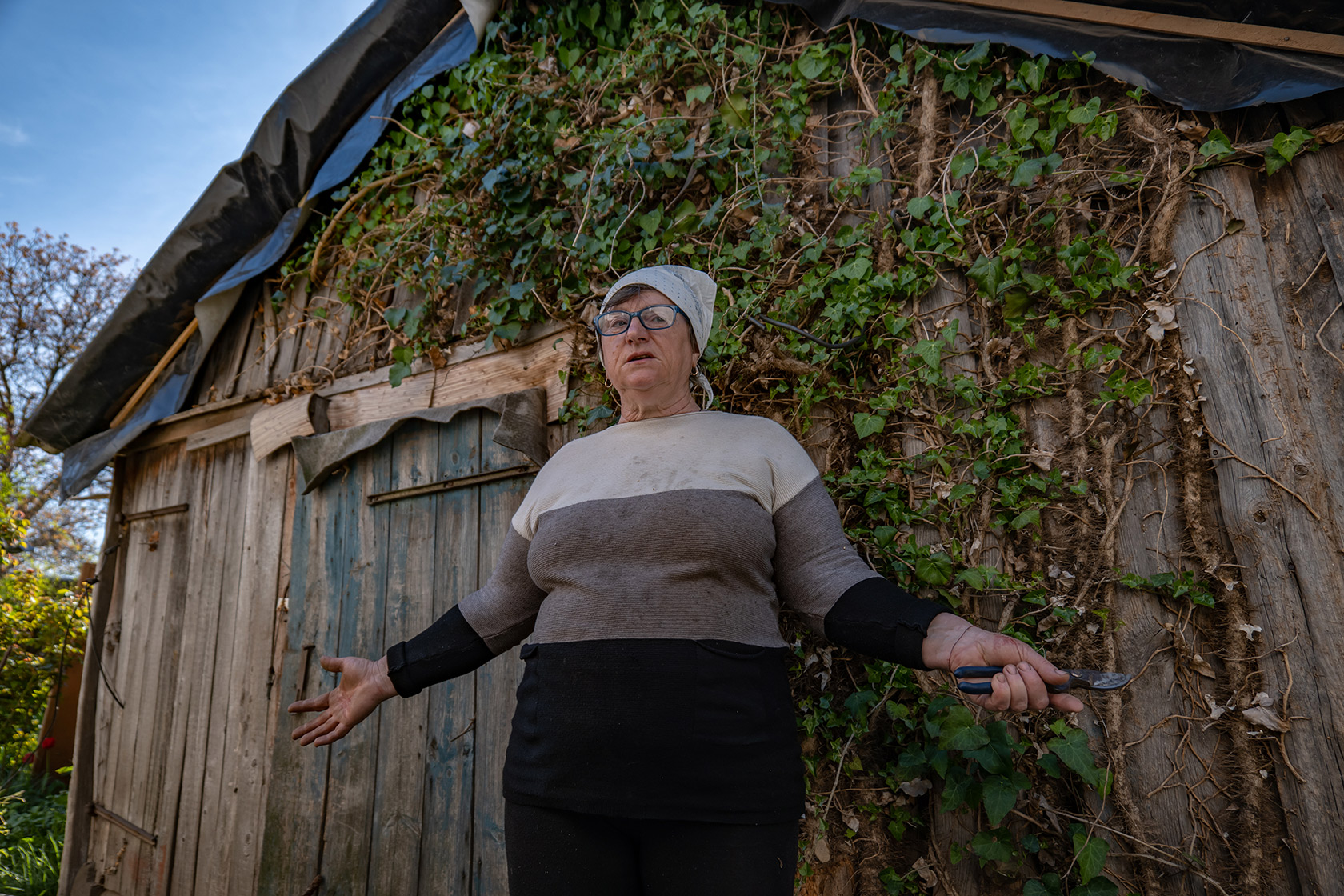 Tamara says: "I told my children that now I will live for myself.
Tamara says: "I told my children that now I will live for myself.
And now I have to renovate the house again after the [Russian] shelling."
"I was cursing a lot!" Tamara says with a smile. "Snowdrops just appeared. I told the [Russian soldiers]: 'Where the hell are you going? Go where your warship went!' I hated them so much."
Major "Norman" Vasilyev occupied the house of Tamara's neighbour Serhii, who is currently fighting in Bakhmut. Russians broke into Tamara's home on the first day of the invasion, guns in hand. They led everyone who was in the basement outside and ordered them to kneel down.
"I couldn't - whether because I was so stressed or for some other reason," Tamara recalls. "I picked up my granddaughter. He tapped me on my shoulder and said: 'Mother, don't worry, I'll spare a bullet for you'. It's a good thing I hid my phone," she continues. "Just before that, I'd made food for guys [from Ukraine's territorial defence forces] who were stationed in Rusaniv.
I'd also exchanged texts with my neighbour Serhii, telling him [Russian] tanks had entered the village."
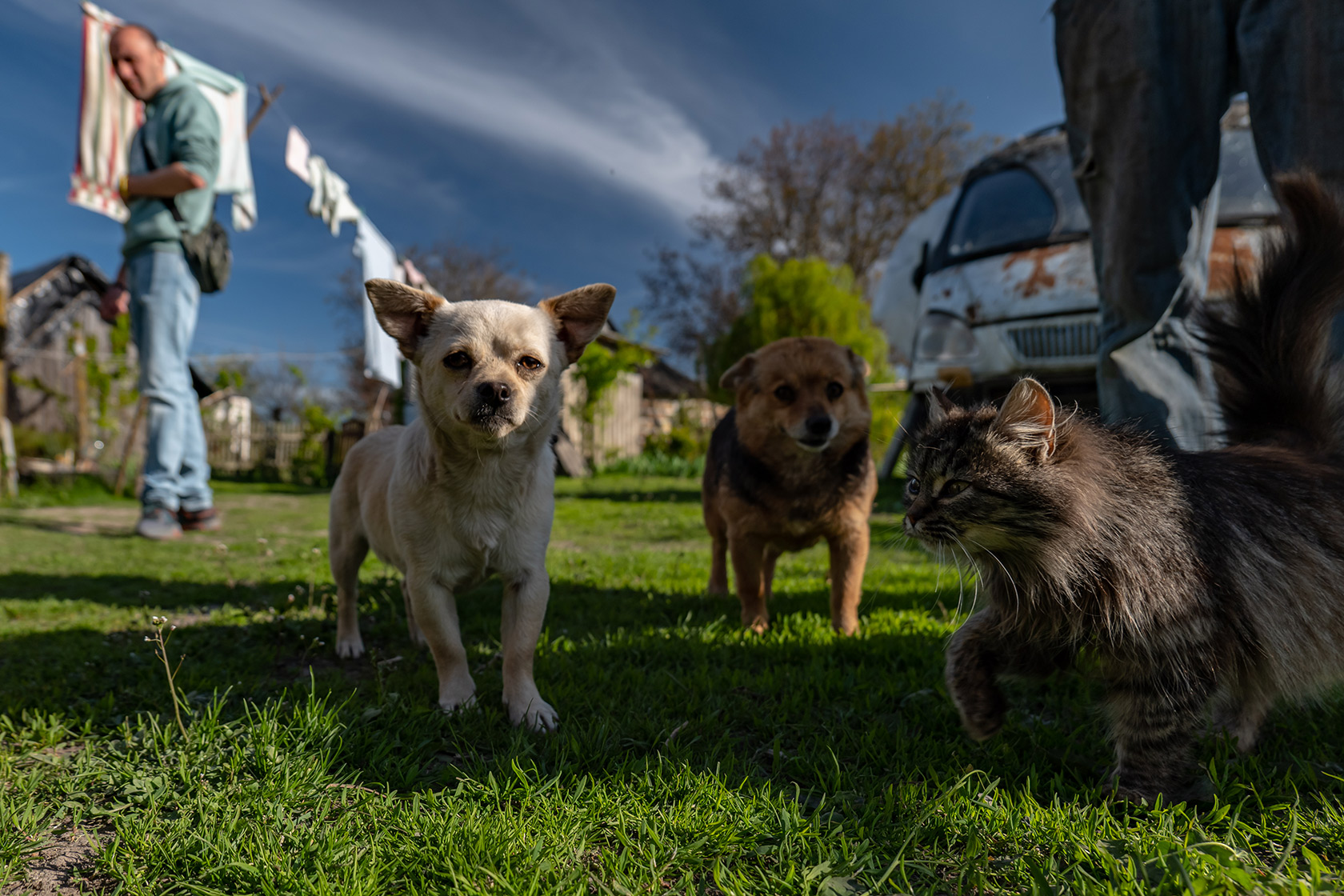 Pulka (left) was born just before the Russian invasion. She survived the Russian occupation, waiting for her owners together with her mom Zhulka (right)
Pulka (left) was born just before the Russian invasion. She survived the Russian occupation, waiting for her owners together with her mom Zhulka (right)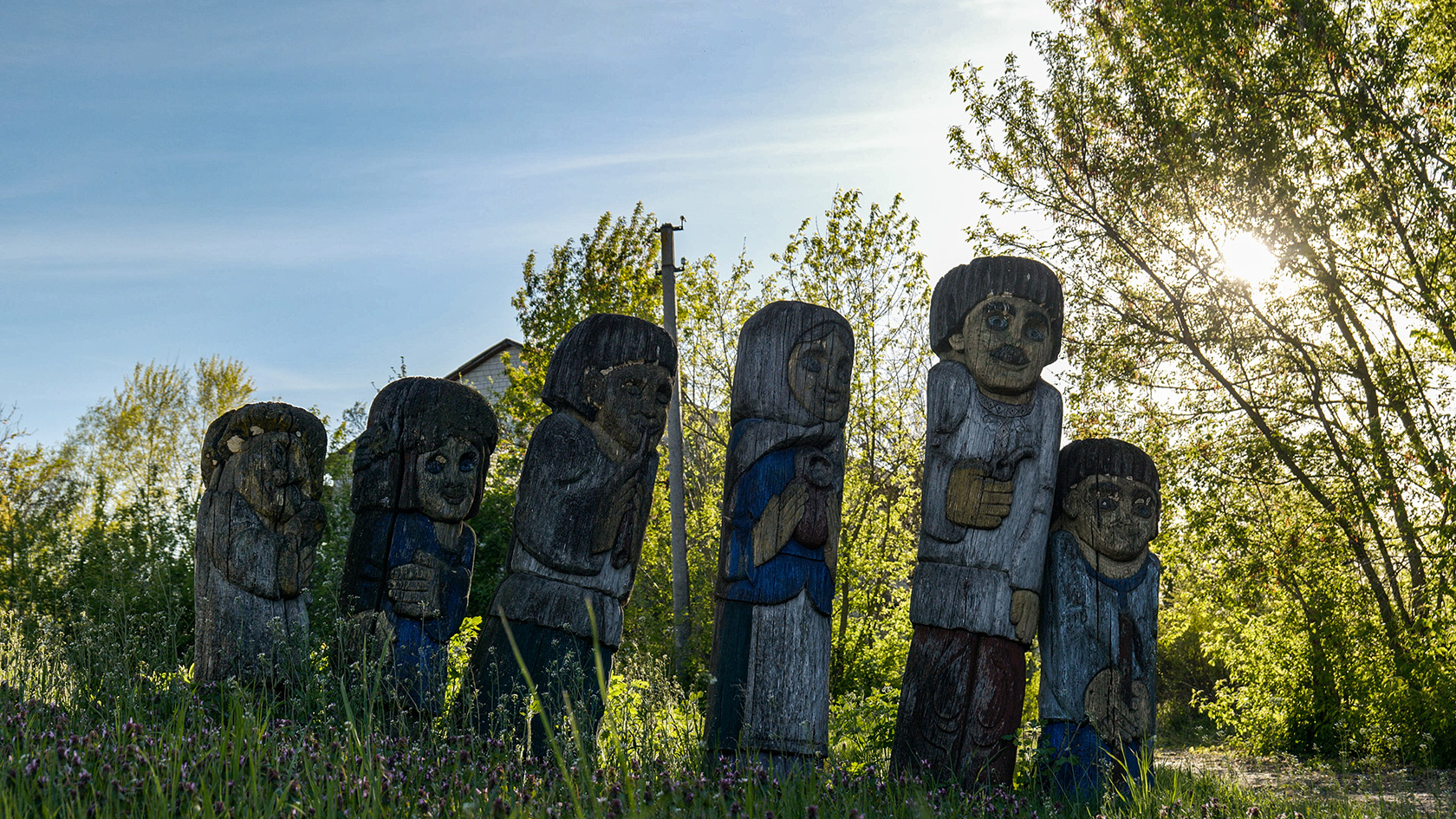 Russians burned one of these sculptures to prepare food over the fire
Russians burned one of these sculptures to prepare food over the fire
Peremoha became a Russian strong point. Snipers set up positions in people's storage huts, storing their ammunition in people's yards, and even in a kindergarten.
They dug trenches and dugouts in people's gardens and among their vegetable patches. Villagers weren't allowed to leave their homes. The Russians would accompany them to [outdoors] toilets at gunpoint.
"They'd let two people out at a time," Tamara says. "I'd take my granddaughter, wrap her in a scarf, and go. Those green scarecrows were afraid we would poison them. They asked my daughter for coffee once.
She brought four cups out. They told her to try it. She did.
They said: 'Try each of them!'"
The church rector
Father Oleksandr (Yarmolchyk) knew nothing about Peremoha when he moved to Kyiv Oblast from his native Zhytomyr Oblast. The 1892 wooden church that he started renovating in mid-90s was all that was left of Yadlivka in 1943. The village was later renamed to Peremoha.
"It was a good church, with five domes," Father Oleksandr says. "In 1936 the communists broke the bells and tore down the domes. In 1943 the Germans burned Yadlivka to the ground, but the church stood. People say it was used for fuel storage.
How did it not blow up? It must be God's miracle."
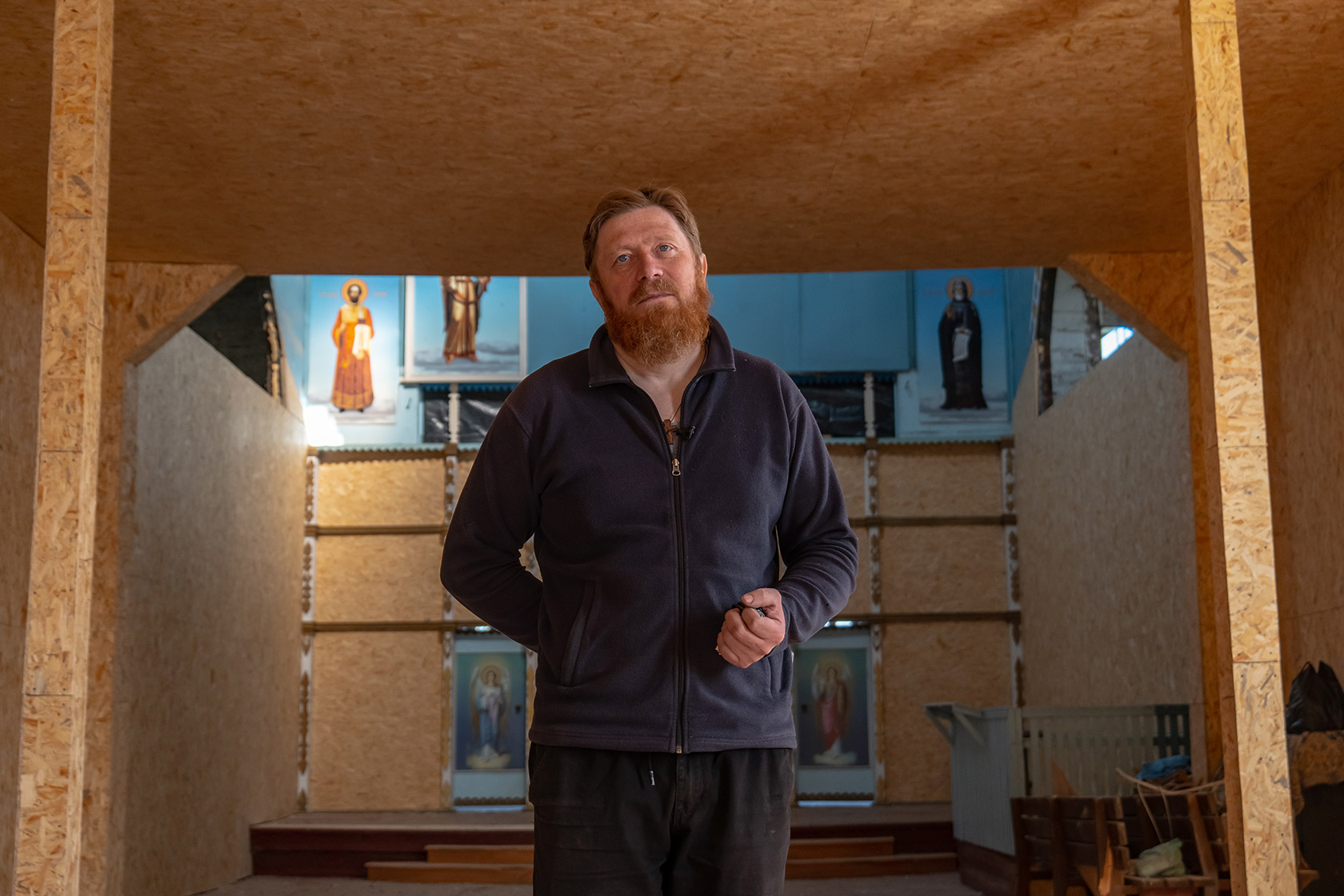 Father Oleksandrrenovated the church after the Germans and the communists, and is now renovating it again after the Russian occupation
Father Oleksandrrenovated the church after the Germans and the communists, and is now renovating it again after the Russian occupation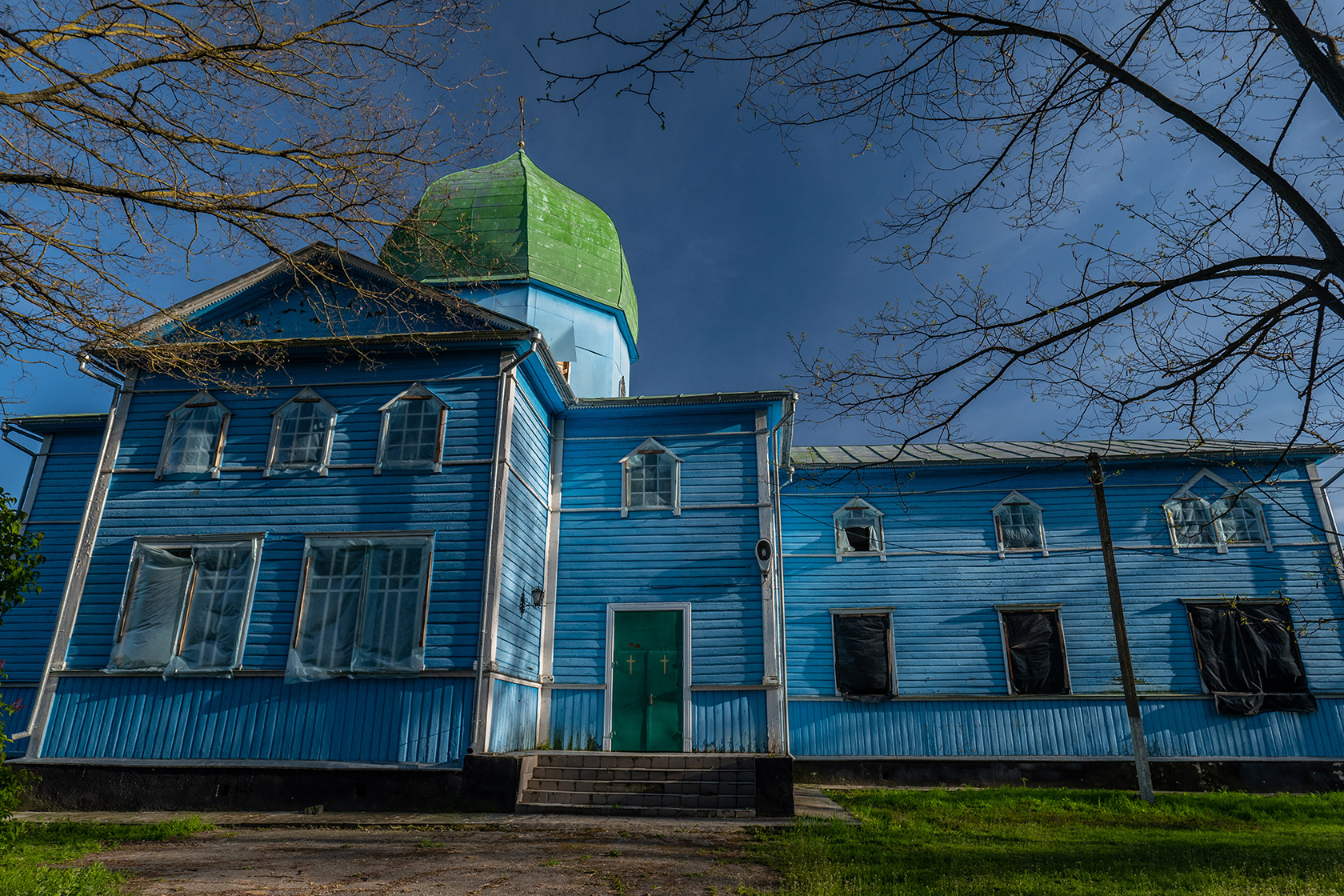 The shattered old church door was displayed at the Kyiv Museum of the History of Ukraine in World War II
The shattered old church door was displayed at the Kyiv Museum of the History of Ukraine in World War II
In spring 2022, Russians fired artillery shells and rounds from large-calibre machine guns at the church's walls, which had seen many prayers, and housed mythical artillery observers who were never actually there. Russian soldiers occupied people's homes, and stationed their military equipment in people's yards and gardens.
"I told them: 'Jesus, what have you done? This is a cemetery, a holy place!' They replied: 'Your guys won't fire at the church'," Father Oleksandr recalls the days he spent under Russian occupation.
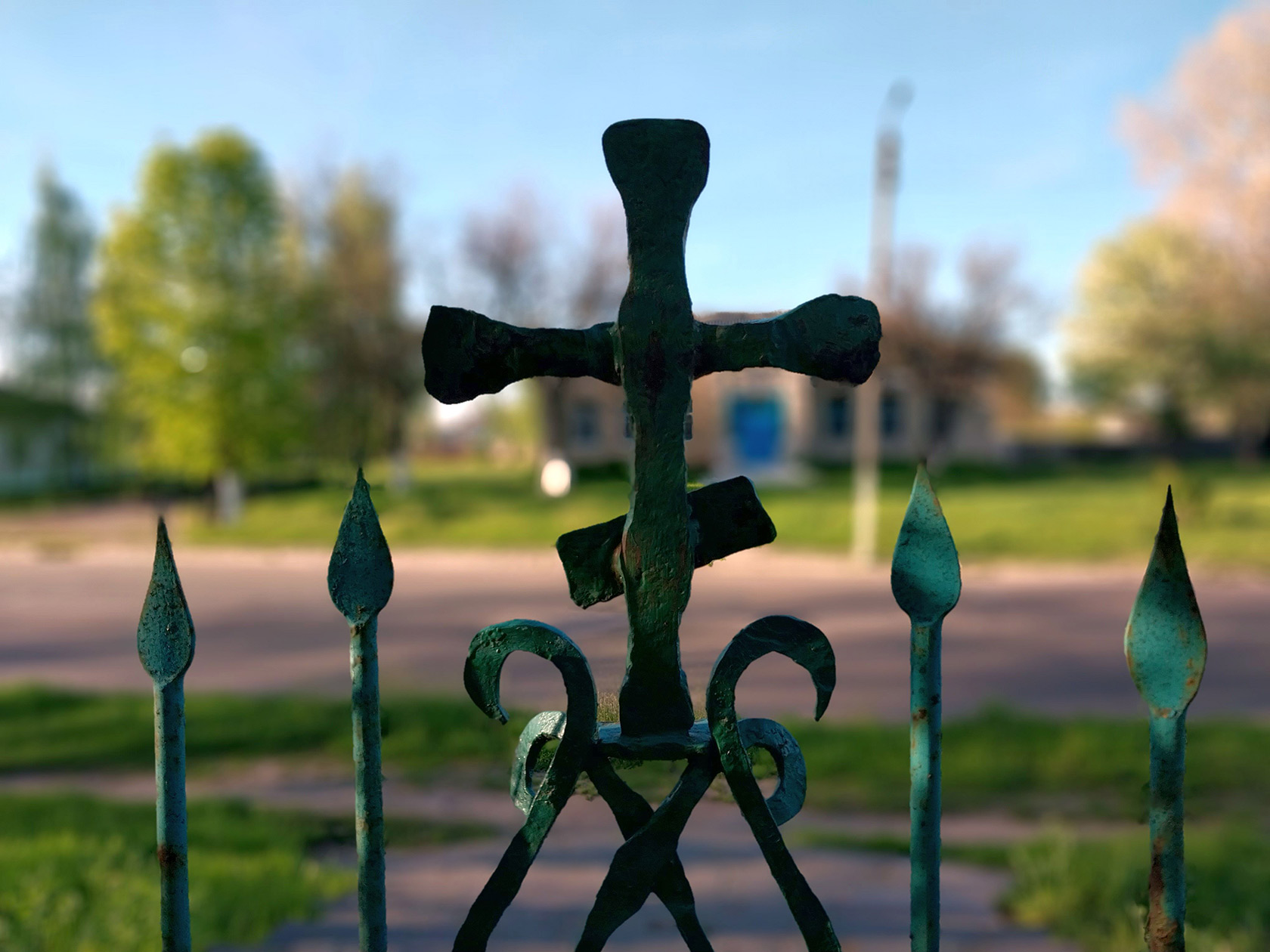 Russian gunners moved into the church after shelling it
Russian gunners moved into the church after shelling it
"I got a call: 'There was shooting in the park!'" the priest recalls. "I approached one [of the Russians] and said: 'I'd like to speak to your commander. Was someone killed there?
I would take their body and bury them.' And he just said: 'We don't kill people. Those were your Nazis.' I replied: 'They still have to be buried.'" The "peacekeeper" from the 15th brigade gritted his teeth: "Take care of your children!" Oleksandr didn't think twice, and left with his family.
"They came to every house," Father Oleksandr says. "They drank all of my wine. These large square bottles. Very strong wine, I don't know where it's made.
People bring it to memorial services, and I never know what to do with it after."
Their own victory
"Mom, look!" Tamara the flower lady's daughter once cried. "He's carrying an ironing board!" "The Russians were looting the shops," Tamara laughs. "I can't explain how funny that was! What do you need an ironing board for?!
Or did he think it was a fold-out bed? But isn't it too small for that? Oh well, they were desperate."
Tamara's parents, who had survived the German occupation of Yadlivka, did not live to witness the Russian occupation. Her father died in January 2022, her mom in July 2021.
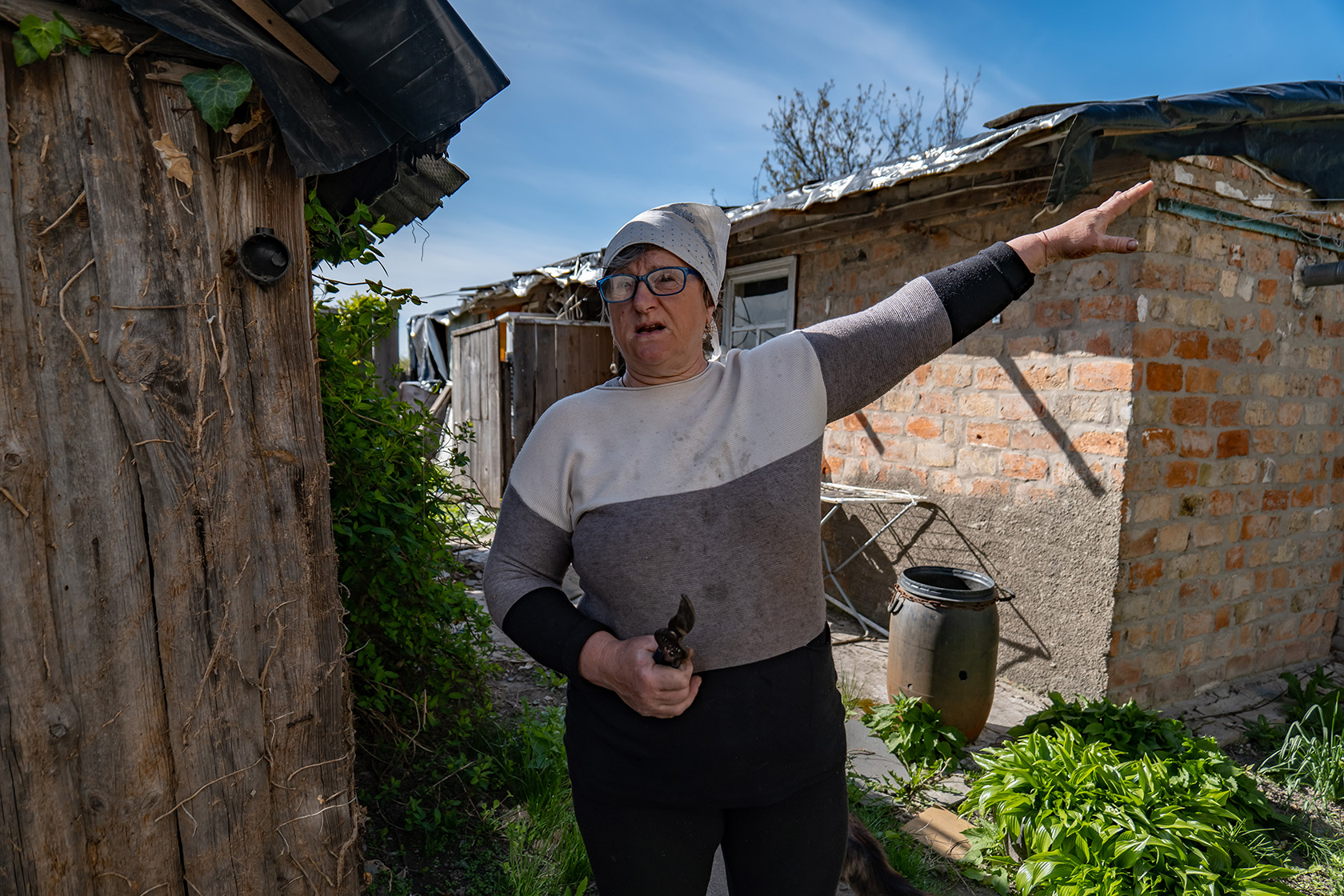 Tamara says she told the Russians that their villages did not have paved roads and proper toilets because they were lazy.
Tamara says she told the Russians that their villages did not have paved roads and proper toilets because they were lazy.
Tamara's son, a Marine, has thoroughly internalised his grandpa and grandma's stories about the past, about good and evil. He fought in Lysychansk and twice suffered contusions.
"They [the Russians] saw his photo in my house. At some point he served in Feodosiia, so one of them said: 'He's one of ours!' And I told them: 'To hell with your guesses! He's mine!
He's my son!" In Peremoha, "war" was always a difficult word. But with the arrival of the Russians, war came out of the past and into the present.
Neither the Soviet soldier monument, nor the enormous obelisk commemorating the "Great Patriotic War" [Russia's way of referring to World War II - ed.] in the village park stopped those who came to Peremoha in 2022 to supposedly kill "Nazis". Tamara, who used to work in the village council, recalls that there would always be a lot of people carrying flowers - lilacs and tulips - every 9 May. That day, she would take food to veterans who lived in Peremoha.
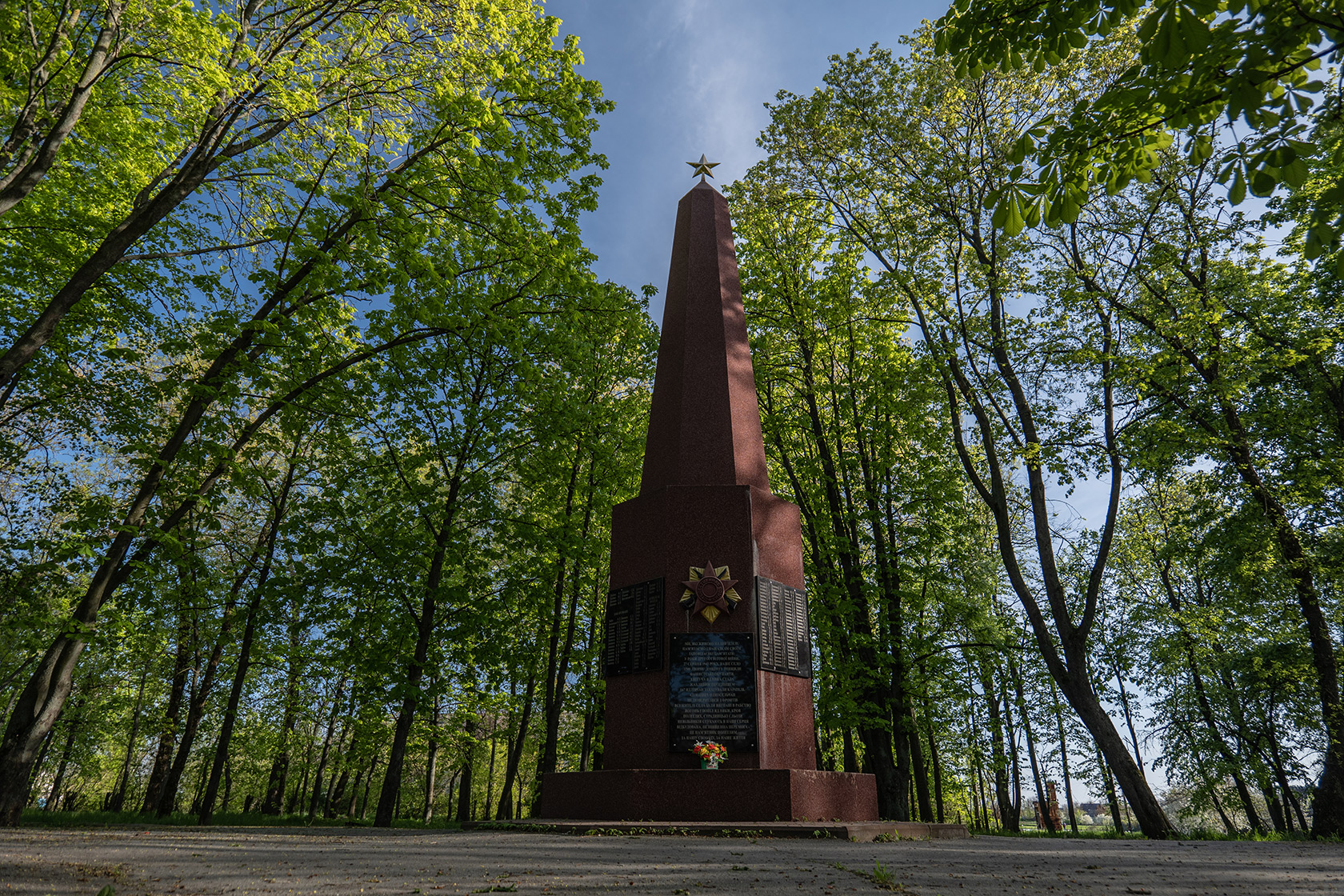 A memorial dedicated to the residents of Yadlivka fallen in World War II is in perfect condition
A memorial dedicated to the residents of Yadlivka fallen in World War II is in perfect condition
"We had over two hundred true combatants," Tamara says. "The collective farm would slaughter a cow for the holiday, and I would bring them meat, grains and canned food.
We have always honoured the veterans. And nowadays in Russia it's like a freak show or something. They display their weapons, but there is no humanity in them.
"Will the village celebrate 9 May now?" Ukrainska Pravda asks. "Probably not," Tamara starts to cry, "for some reason I don't think so. There will be no 9 May!
We will celebrate when our very own victory comes. The most important thing is that all the boys come home. That is what we will celebrate."
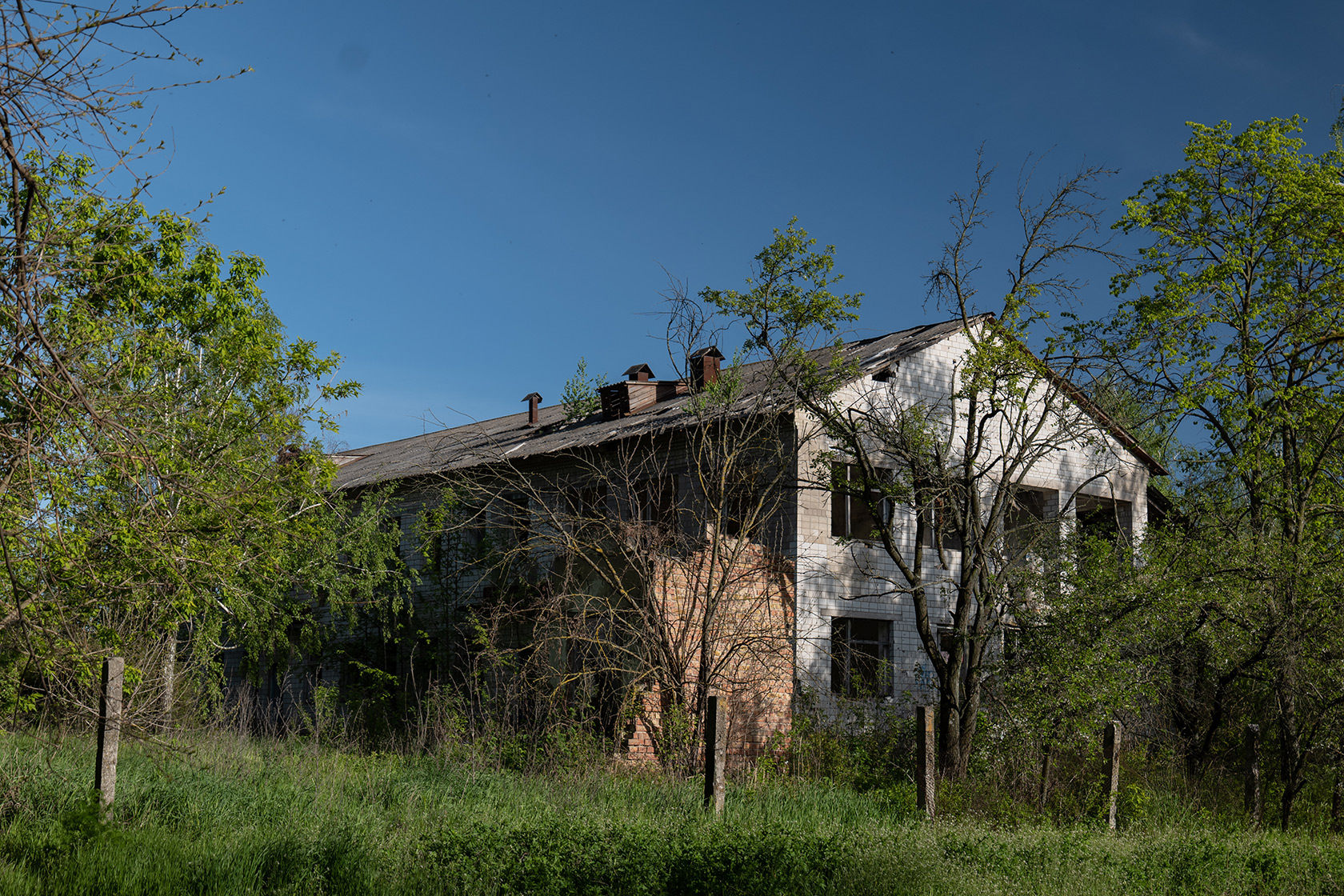 The destroyed building of a kindergarten where Russians stored ammunition
The destroyed building of a kindergarten where Russians stored ammunition
Olha
The Russians did not flee from Peremoha on an empty stomach.
"They cleaned out all the cellars, got drunk and slaughtered cattle," Olha Bondar says about her month under Russian occupation. "Once, apparently, they couldn't handle any more meat, they were stuffed, so they just cut off the rear of a pig. It crawled into the barn to the piglets, bleeding to death." Olha has spent all her working life in intensive care.
She is a recent arrival to Peremoha. Four years ago, she came from Mykolaiv (a city in southern Ukraine) with her husband, a former prosecutor. They bought a rural house at Khreshchatyk Street, formerly Lenin Street, finding a compromise in their wishes. [Khreshchatyk is also the name of a street in central Kyiv considered the main street of Ukraine - ed.]
"My husband wanted to live in Kyiv, and I wanted to live in the country. Now, according to the documents, we own a house on Khreshchatyk," she laughs.
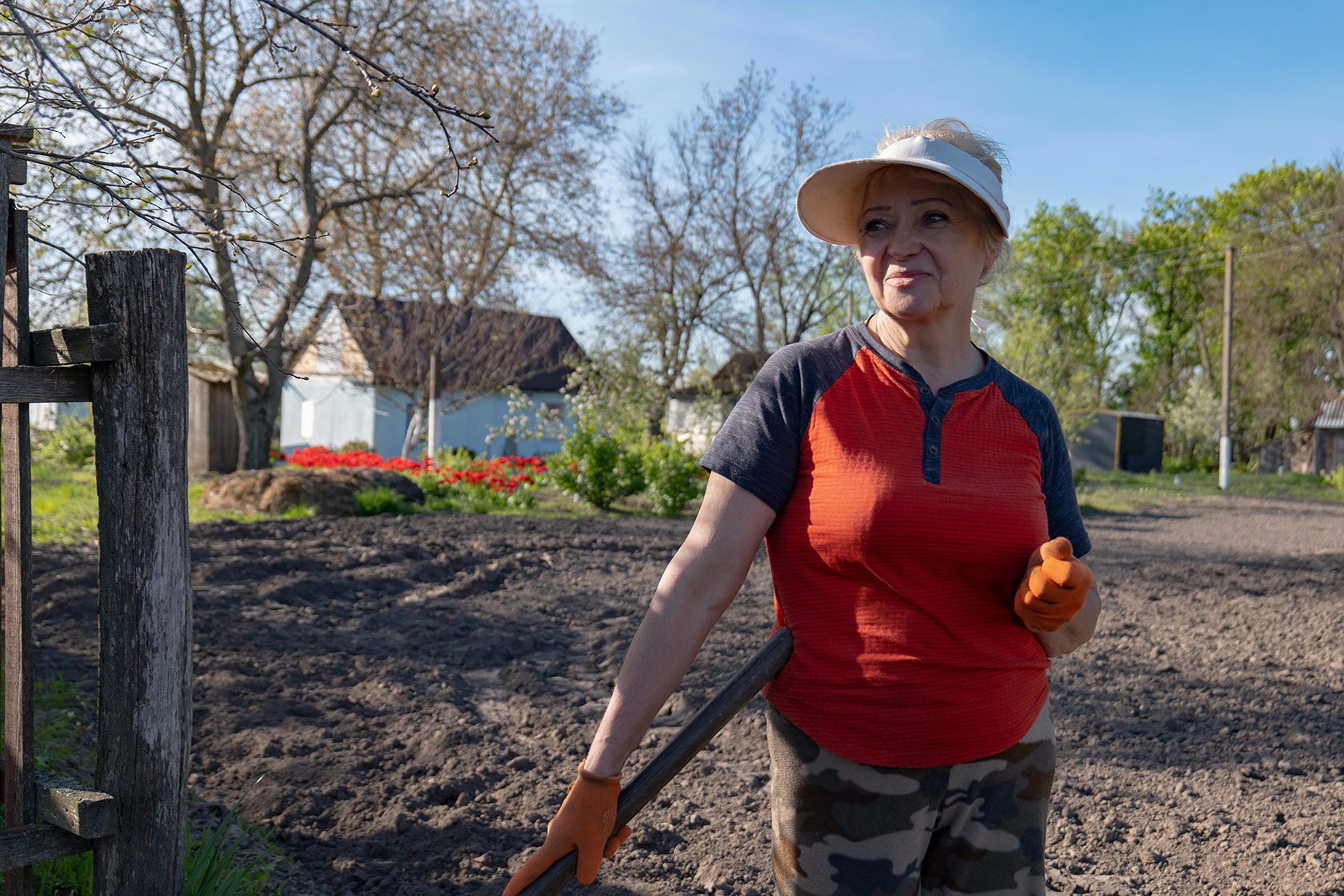 Olha: "On 8 May, we will light candles for our grandfathers and have a moment of silence. But I have never walked around with photos of my grandfathers on sticks, God forbid!"
Olha: "On 8 May, we will light candles for our grandfathers and have a moment of silence. But I have never walked around with photos of my grandfathers on sticks, God forbid!" 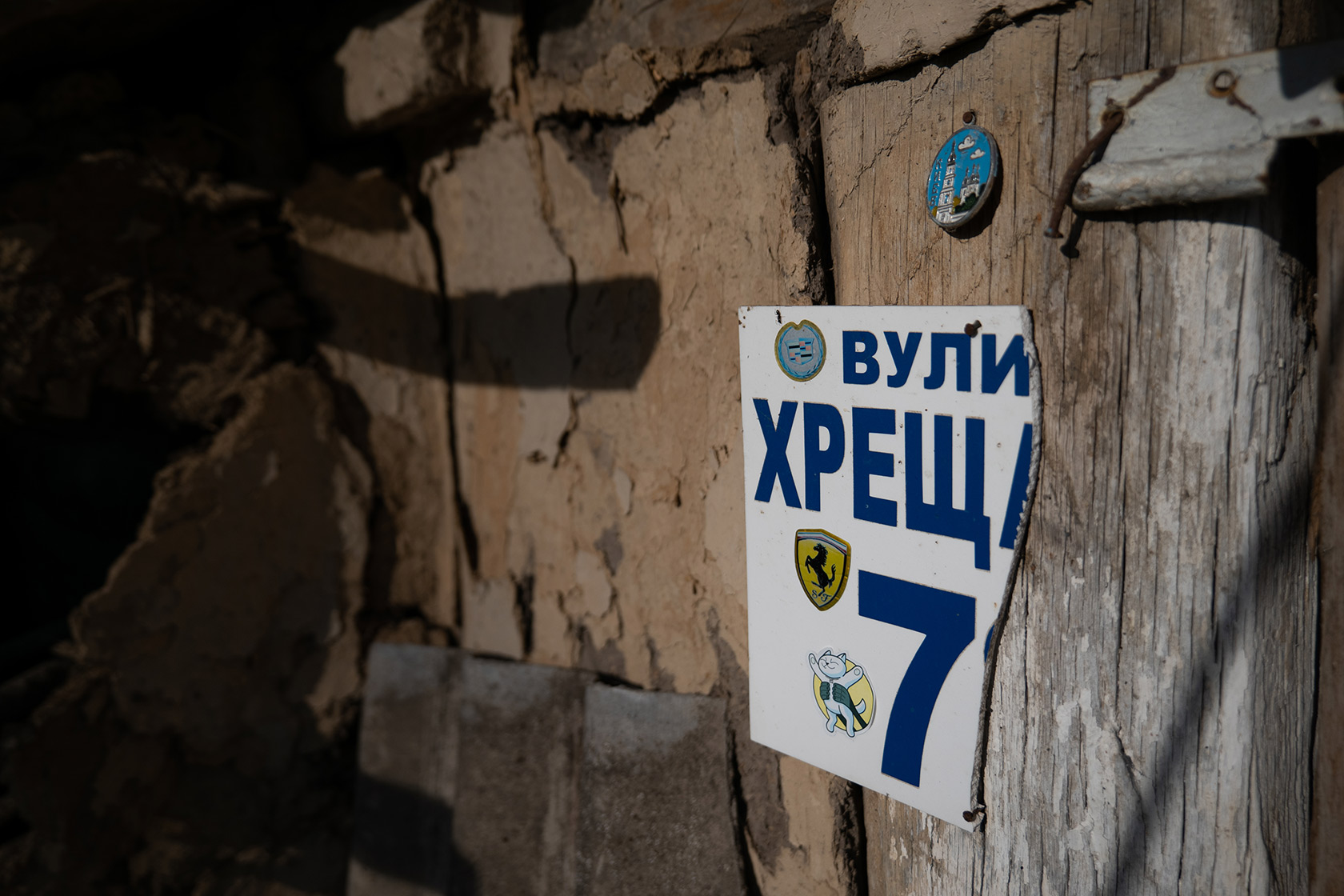 One of the destroyed houses on the local Khreshchatyk
One of the destroyed houses on the local Khreshchatyk
In retirement, Olha took up looking after her house and garden and volunteering with the animals.
During the first days of Russian occupation, she took care of her neighbours' animals. She checked the houses where Russians were quartered. But after a week, she was no longer allowed to go do her rounds.
"During the night bombardments, the most frightening thing was when untied, unmilked cows were screaming in the village," Olha says. "I was asking to be allowed to see them. But they thought I was a spy. They checked my push-button phone every day.
I would bury my smartphone in a greenhouse. My brother-in-law used to call me on it: 'Stay in the basement. Our people will come soon, real soon!'"
Barbarians
All kinds of Russians were seen in Peremoha.
Those who entered the village first were inspired and optimistic. Having executed several locals, they anticipated an imminent victory over "Nazism" and the capture of Kyiv. They talked about how well Ukraine would live under Russian rule.
The second group was gloomier and angrier: after the fierce resistance of Ukrainians, the enemy was struck by confusion. The third group, Olha recalls, didn't look much like soldiers: they wore gumboots or stolen sneakers and variously coloured jackets.
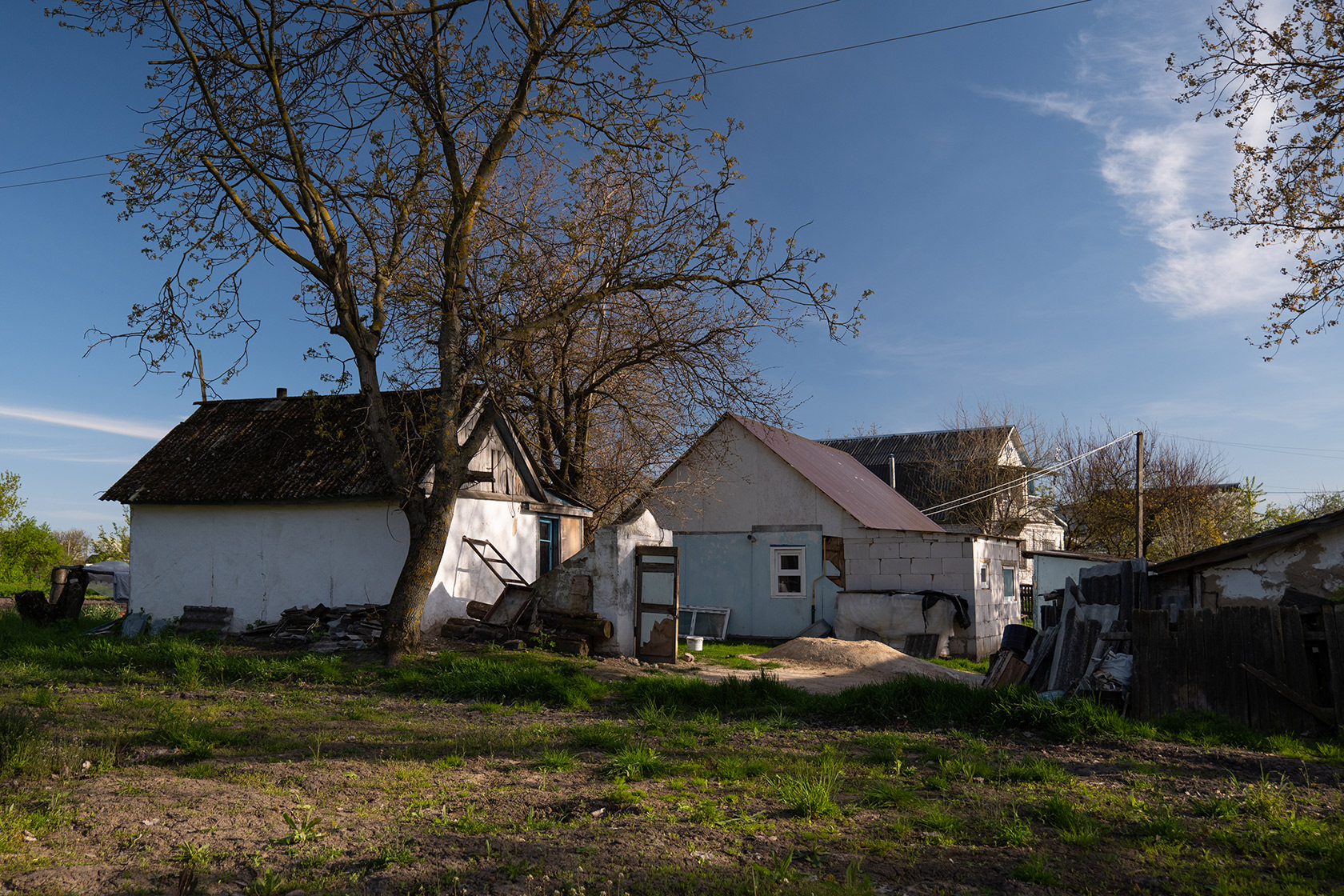 The Russians quartered in this house of local resident Hanna. They kicked her out, killed her dog and ate her goat.
The Russians quartered in this house of local resident Hanna. They kicked her out, killed her dog and ate her goat.
"I would still argue with the first group, trying to convince them: there are no Nazis here!" Olha says. "People in the village have always honoured veterans.
My husband was already thinking about where he would bury me. I was screaming in this place and in that place. He decided that he would bury me by the greenhouse."
The Bondar couple had already had a similar experience. When a lonely old man died on their street, Russian occupiers did not allow them to take the body to the cemetery. The couple buried the man in his garden.
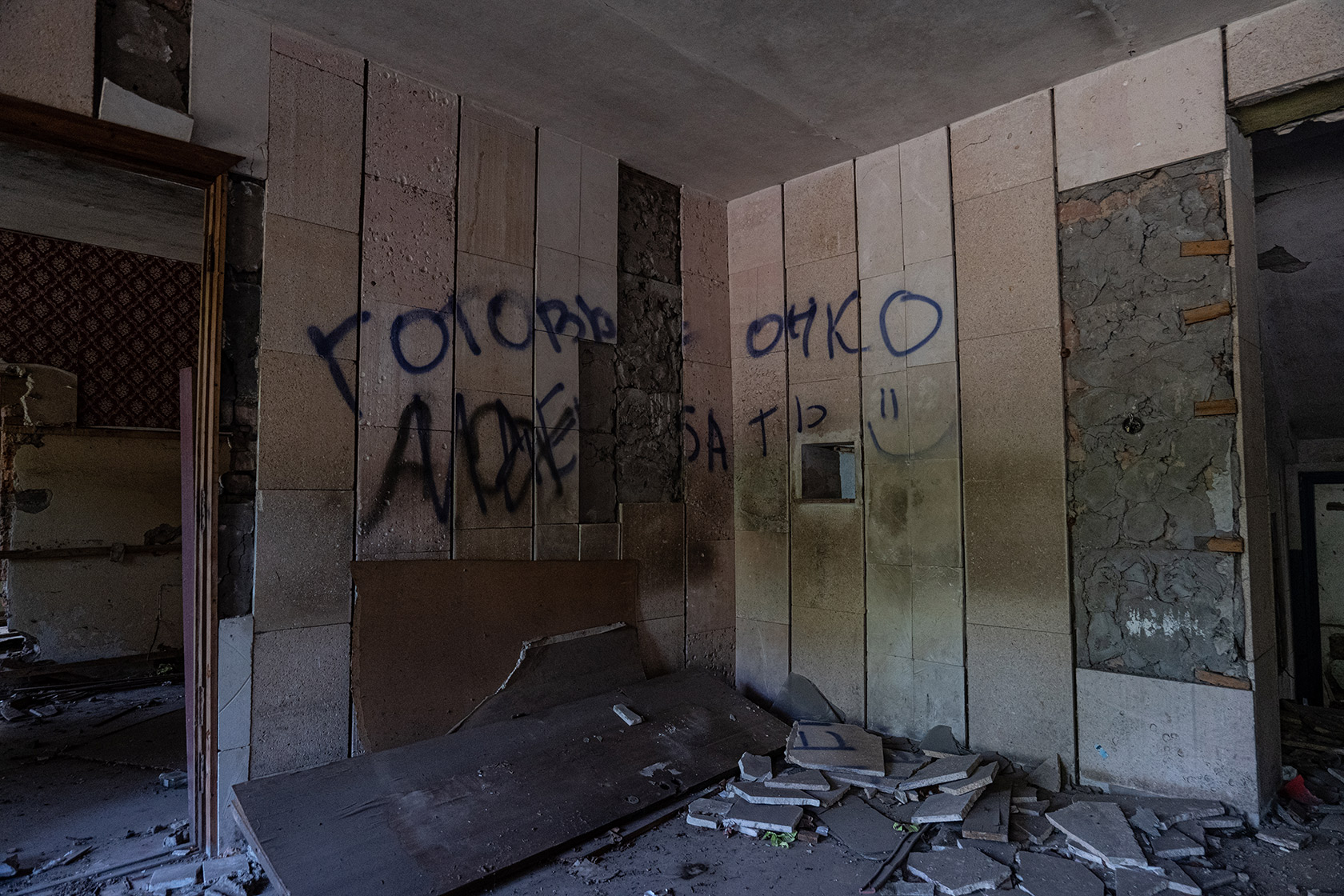 Remnants of the "Russian world" in the village of Peremoha.
Remnants of the "Russian world" in the village of Peremoha.
The graffiti sign reads "Prepare to be f*cked".
[Russkiy mir, literally "Russian world" or "Russian order", is the concept of total domination of Russian culture over other cultures; it gives rise to and "legitimises" Russia's current expansionist, colonial politics - ed.]The Russians did not flee from Peremoha empty-handed. "No one can convince me now that they are not looters," Olha says. "I saw the carpets and washing machines [they took when retreating] with my own eyes. It took them about three hours to leave the village.
They loaded everything into tanks and into cars that they 'confiscated' from local farmers. And before that, when they would get drunk, they would have 'fun' by knocking down poles with tanks for some reason. They would also take cars from people's garages and drive them around.
And when they ran out of gas, they would run them over too. Barbarians!"
Follow my conscience
9 May in Peremoha has always been a ceremonial day. The customs have changed over the years, but nothing has been forgotten.
"A memorial service was held at the Soldier's monument, and all the tortured residents of Yadlivka were remembered. There was even a pedestal, like at a mausoleum, covered with red cloth. I stood on that pedestal in a cassock.
I watched the children recite poems," Father Oleksandr smiles. After Ukraine became independent, he started changing the world around by changing himself first: he read and studied history. "I also used to think it was nice to live in a 'great country'," he recalls. "But then I learned how much this 'great country' trampled our geniuses.
How they were afraid of our language! They even fought against the language. How much money they invested, how much time they spent, but they still failed to destroy all things Ukrainian."
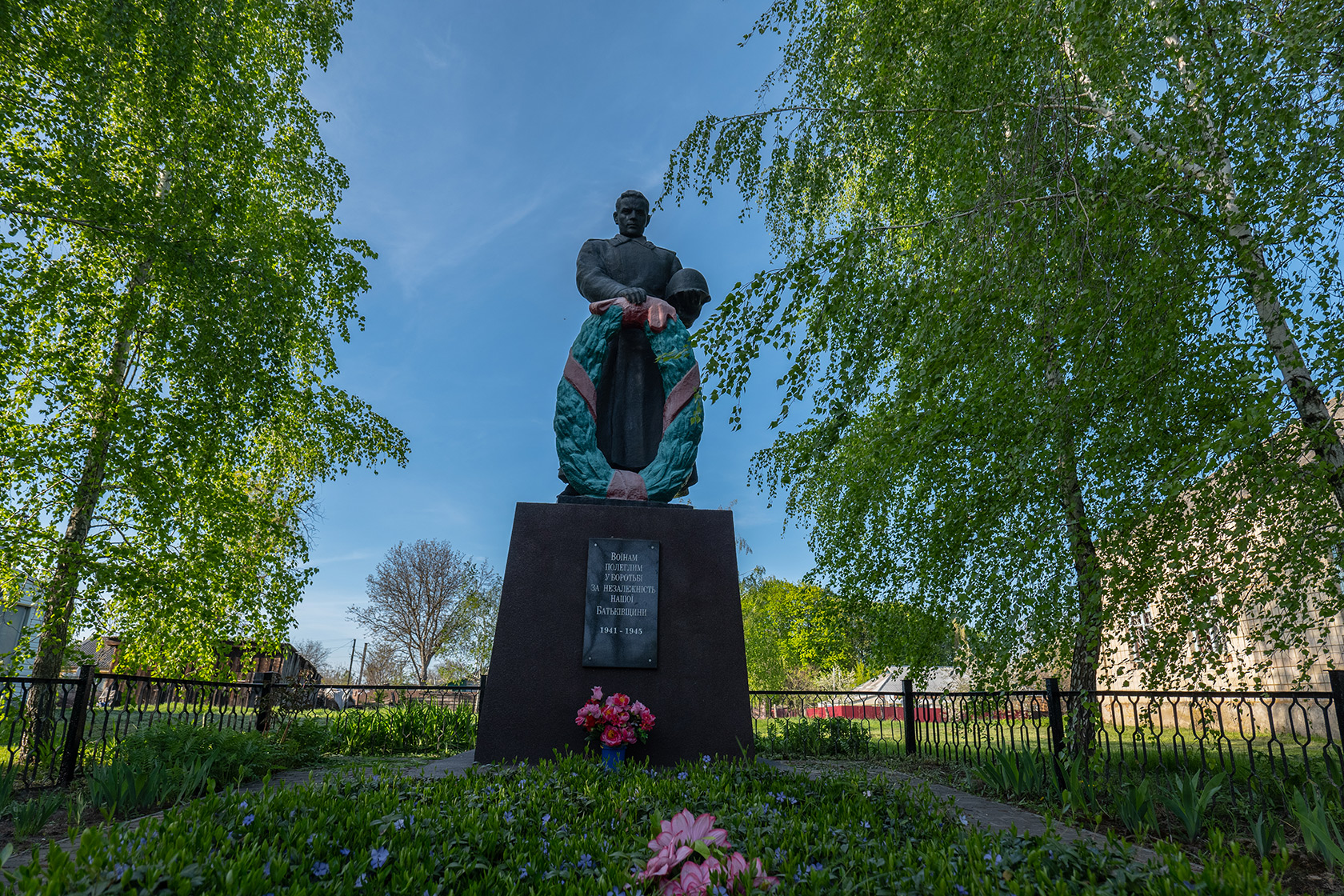 The monument to the Soviet soldier is in perfect condition
The monument to the Soviet soldier is in perfect condition
The parishioners of Peremoha moved from the Moscow Patriarchate to the Orthodox Church of Ukraine in 2019 without any noise or scandal.
"People themselves decided so," the priest says. "Bishop Antonii called me [Boryspil Diocese of the Moscow Patriarchate -ed], trying to persuade me to stay. He said that I would have everything in abundance. I replied: 'I will not fool anyone.
I must follow my conscience.'" Despite his authority, Father Oleksandr was unable to convince his parishioners of something he considered important. Even before the invasion, he had proposed to restore the original name of the village, Yadlivka.
But even the young objected: "We were born in Peremoha!" "It is as though the village only began to live in 1945. And how about everything that had preceded that?
We are losing a whole chapter of history. But... How can I keep going on about it?
If they want Peremoha, let them have Peremoha." The Russian occupation added new meanings to this Soviet place name. "We are the winners, of course!" Tamara laughs. "Our church survived the Germans.
And now we have survived for the second time." "As you name a ship, so it will sail. And this goes for our village of Peremoha [Victory] too," says Olha.
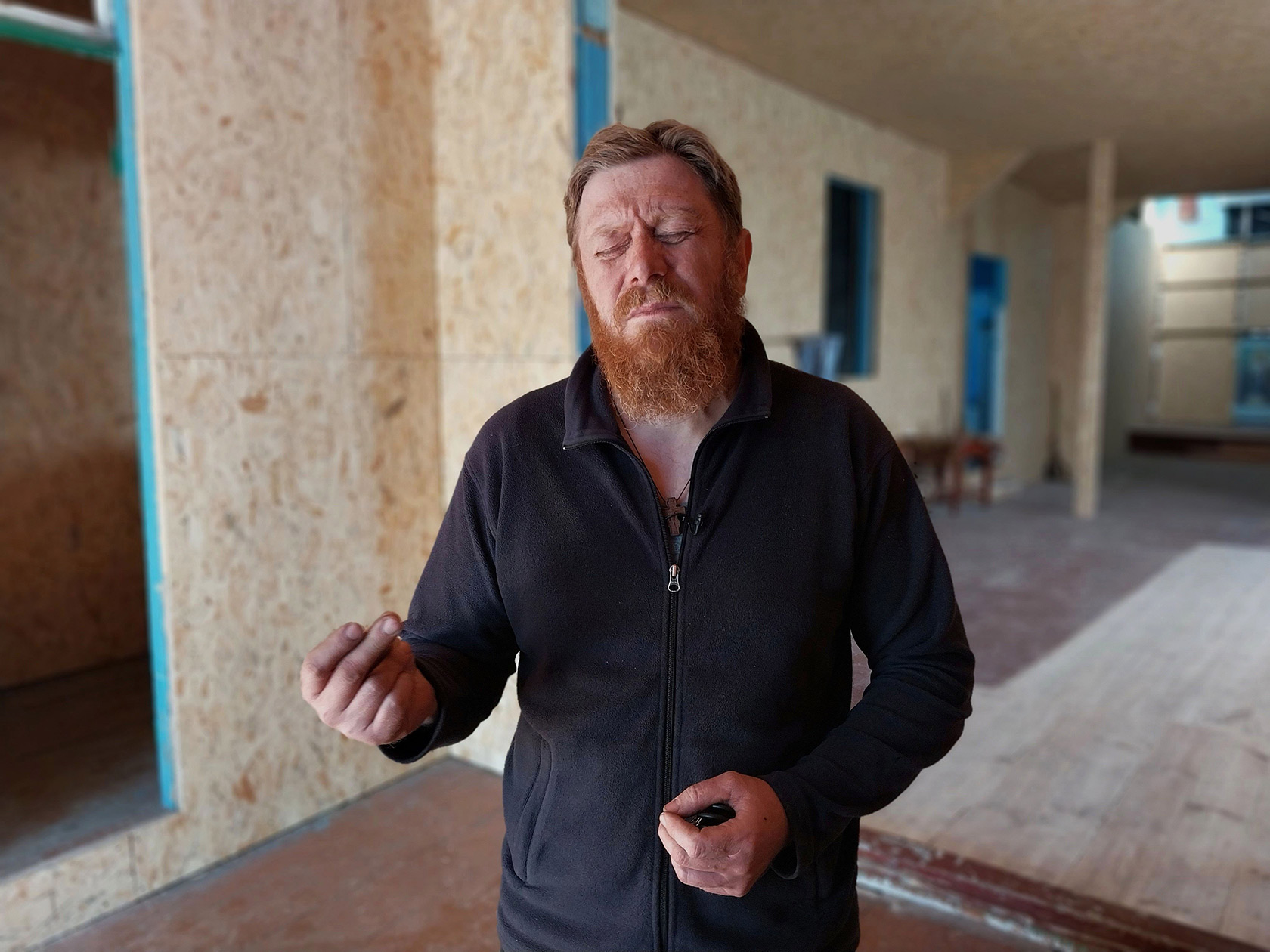 Father Oleksandr: "The merciful Lord wants us to forget that terrible time.
Father Oleksandr: "The merciful Lord wants us to forget that terrible time.
But you can't forget something like that."
Father Oleksandr recalls that a few years ago they were going to erect a monument over the burial site of human remains from the Second World War. The monument - an angel taking people into his wings, people with no faces, wearing nightgowns - was supposed to evoke images of the Yadlivka residents who were burned in 1943. Russia's invasion put the project on hold.
Last spring, a new mass grave appeared near the old one.
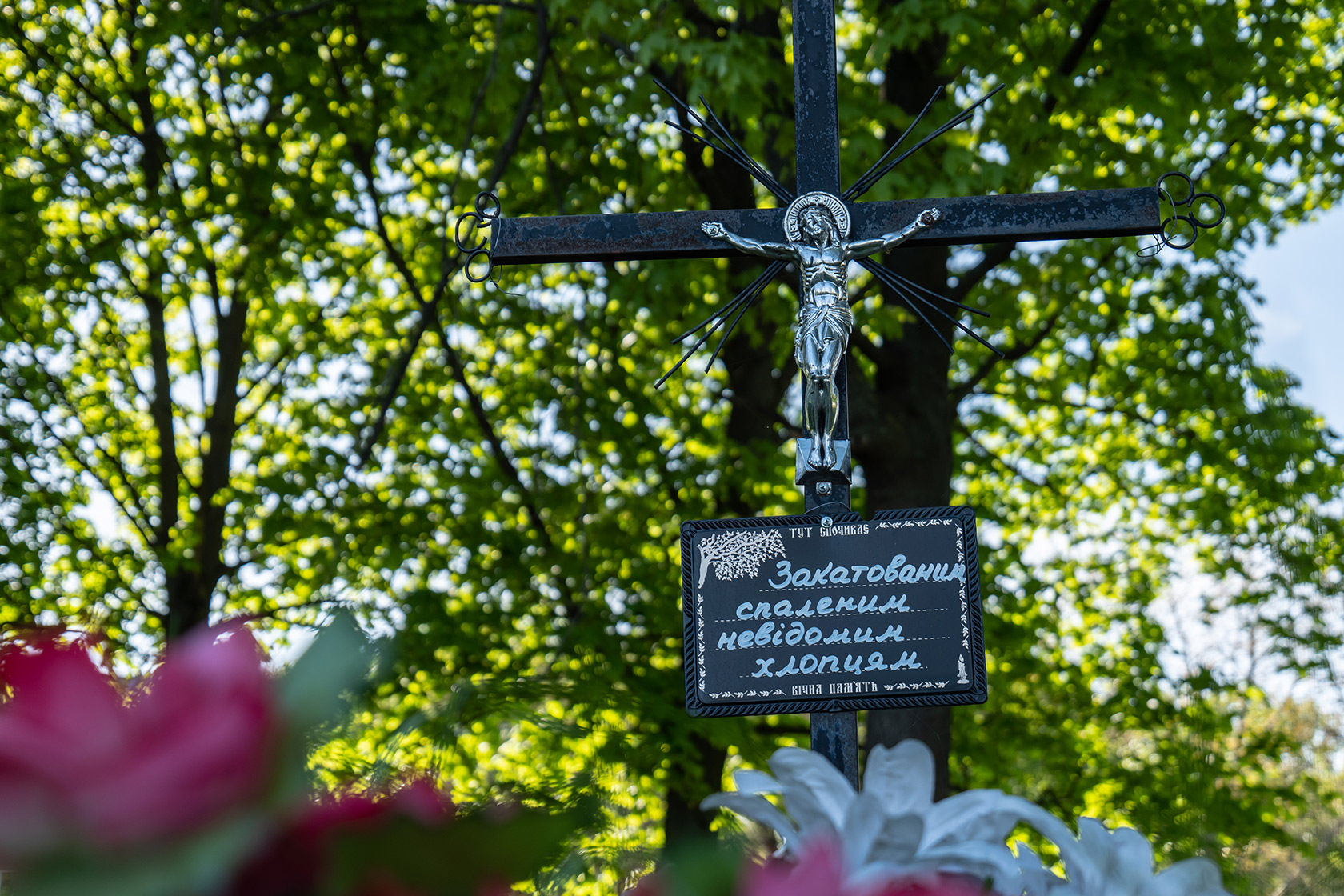 Traces of the "Russian world" in the village of Peremoha in Kyiv Oblast. The plaque reads: "For tortured, burned to death, unknown boys"
Traces of the "Russian world" in the village of Peremoha in Kyiv Oblast. The plaque reads: "For tortured, burned to death, unknown boys"
Locals can name the exact date of the liberation of Peremoha, 30 March 2022, even in their sleep. "But this is not the Victory Day yet," Father Oleksandr says. "We understand that the war is not over yet, the boys are dying.
We have not won yet, the enemy has not yet been defeated. But we believe: The Lord will not leave us, so that our people will never become 'Russians', 'Lesser Russians' or 'not-quite-Russians'. [A reference to the time when Ukraine was called Lesser Russia under the Russian Empire - ed.]" Yevhen Rudenko, Nazarii Mazyliuk, Ukrainska Pravda
Translation: Olya Loza and Oxana Hart
Editing: Sam Harvey